七夕节 (Qīxī Jié), known as the Qixi Festival or Chinese Valentine's Day, is a significant traditional Chinese holiday celebrated on the seventh day of the seventh lunisolar month. With a rich history spanning over 2000 years, it's anchored in the captivating love story of the Cowherd and the Weaver Girl. Join us as we delve into this enchanting legend and see how modern festivities intertwine with ancient tales.
1. The Story Of Qixi Festival
The Origin Of Qixi Festival
Qīxī de láiyuán shì xiānqín shíqī de jìsì, nà shíhou rénmen chóngbài zìrán, chóngbài tiānxiàng, zài Nónglì qī yuè huì jìsì Qiānniú Xīng hé Zhīnǚ Xīng.
七夕的来源是先秦时期的祭祀,那时候人们崇拜自然,崇拜天象,在农历七月会祭祀牵牛星和织女星。
(The) origin of Qixi Festival is (the) sacrificial-ceremony of (the) pre-Qin period, (at) that time, people worshiped nature, (and) worshiped celestial phenomena, (and) in (the) 7th month (of the) Chinese Lunisolar Calendar (would) perform-sacrificial-ceremony-to Altair (Cowherd Star) and Vega (Weaver Girl Star).
Qixi Festival And The Love Story Behind It
Dào le Hàn Dài, Qīxī Jié de bèihòu yòu duō le yí ge hěn měilì de ’àiqíng gùshi:《Niúláng Zhīnǚ》. Chuánshuō, Niúláng hé Zhīnǚ shì yí duì liànrén, tāmen dàibiǎo de shì tiān shang de Qiānniú Xīng hé Zhīnǚ Xīng. Kěxī, tāmen de ’àiqíng méiyǒu dédào Tiāndì de yǔnxǔ, suǒyǐ zhǐ néng bèipò fēnkāi, yí ge zài Yínhé zhèbiān, yíge zài Yínhé nàbiān. Zhǐ yǒu měi nián Nónglì qī yuè chū qī zhè yì tiān, tiān shang de xǐquè huì zài Yínhé shang dā qǐ yí zuò Quèqiáo, ràng Niúláng hé Zhīnǚ zài Quèqiáo shang tuánjù.
到了汉代,七夕节的背后又多了一个很美丽的爱情故事:《牛郎织女》。传说,牛郎和织女是一对恋人,他们代表的是天上的牵牛星和织女星。可惜,他们的爱情没有得到天帝的允许,所以只能被迫分开,一个在银河这边,一个在银河那边。只有每年农历七月初七这一天,天上的喜鹊会在银河上搭起一座鹊桥,让牛郎和织女在鹊桥上团聚。
(Having) arrived the Han Dynasty, (there has) been one very beautiful love story added (on the) back of Qixi Festival: (The) Cowherd (And The) Weaver Girl. (It is) said(-in-the-)legend, (that) (the) Cowherd (and the) Weaver Girl are a pair of lovers, (and what) they represent (are) Altair (Cowherd Star) and Vega (Weaver Girl Star). Unfortunate(ly), their love (did) not receive (the) approval (of the) Heavenly Emperor, so (they) can only be-forced to separate, one is-on this side of (the) Milky Way, (and) one is-on that side of (the) Milky Way. (There) only “exists” this one day (-) (the) 7th day (of the) 7th month (of the) Chinese Lunisolar Calendar (of) every year, (the) magpies in (the) sky will build a magpie bridge on the Milky Way, letting (the) Cowherd and (the) Weaver Girl reunite on (the) magpie bridge.
How Chinese People Celebrate Qixi Festival Today
Suǒyǐ, Qīxī yě chéng le hé ’àiqíng yǒuguān de jiérì. Zhídào jīntiān, dānshēn de nánhái nǚhái huì zài zhè yì tiān xǔyuàn、biǎobái, liàn’ài zhōng de nán nǚ yě huì gěi zìjǐ de ’àiren sòng lǐwù、hé zìjǐ de ’àiren yuēhuì.
所以,七夕也成了和爱情有关的节日。直到今天,单身的男孩女孩会在这一天许愿、表白,恋爱中的男女也会给自己的爱人送礼物、和自己的爱人约会。
Therefore, Qixi also (has) become (a) festival related to love. Arriving today, single boys (and) girls will on this day make-wish, confess-love, men (and) women in love will also give gifts to their-own lovers, (and) have-dates with their-own lovers.
The Story of Qixi Festival in English Translation
The origin of Qixi can be traced back to the pre-Qin period's worship ceremonies. Back then, people worshipped nature and celestial phenomena, and they would worship the Altair (Cowherd star) and Vega (Weaver Girl star) during the seventh lunar month.
By the Han Dynasty, there was a beautiful love story behind the Qixi Festival: "The Cowherd and the Weaver Girl." Legend has it that the Cowherd and the Weaver Girl were lovers, representing the Altair and Vega stars in the sky. Unfortunately, their love was not permitted by the Heavenly Emperor. Thus, they were forced to separate, one on each side of the Milky Way. Only on the seventh day of the seventh lunar month each year, magpies would form a bridge over the Milky Way, allowing the Cowherd and the Weaver Girl to reunite on the bridge.
Thus, Qixi became a festival related to love. Even today, single boys and girls will make wishes and confess their feelings on this day, while those in love will give their significant others gifts and go on dates.
2. Vocabulary And Example Sentences Related To Chinese Qixi Festival
Learning about the Qixi Festival helps us understand Chinese culture better. This section teaches about a special holiday called Chinese Valentine's Day. It also gives words and phrases about love, stars, and daily life. By studying this, you can talk more easily with Chinese people and understand Chinese stories about love and festivals.
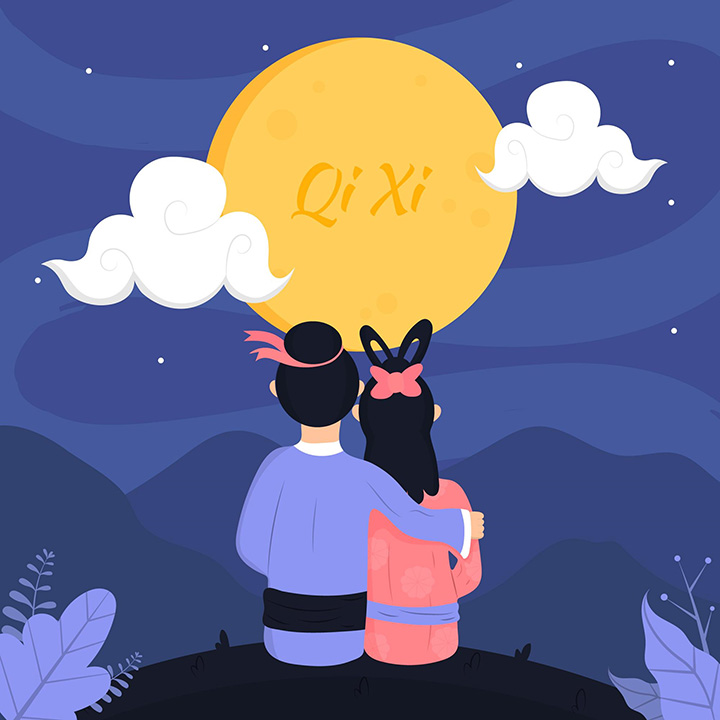
七夕 Qīxī ▸Qixi Festival; Double Seventh Festival; Chinese Valentine’s Day
七夕节 Qīxī Jié ▸ Qixi Festival; Double Seventh Festival; Chinese Valentine’s Day
Qīxī jiù yào dào le, nǐ dǎsuàn zěnme guò? -
七夕就要到了,你打算怎么过?
Qixi soon will come, how (do) you plan to celebrate (it)?
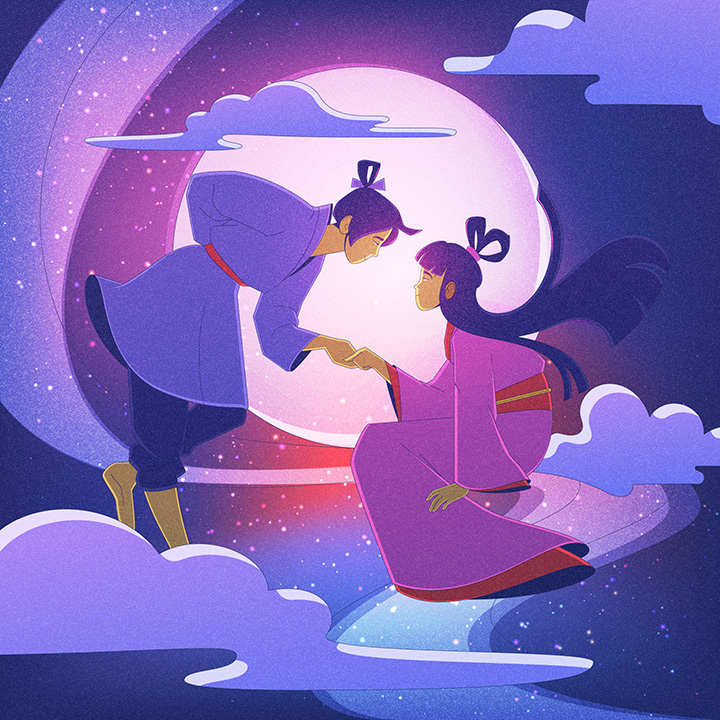
牛郎 Niúláng ▸ the Cowherd
织女 Zhīnǚ ▸ the Weaver Girl
Wǒ hé nánpéngyou shì yìdìliàn, jiù xiàng Niúláng Zhīnǚ yíyàng.
我和男朋友是异地恋,就像牛郎织女一样。
Me and (my) boyfriend are long-distance-romance, just like (the) Cowherd (and the) Weaver Girl.
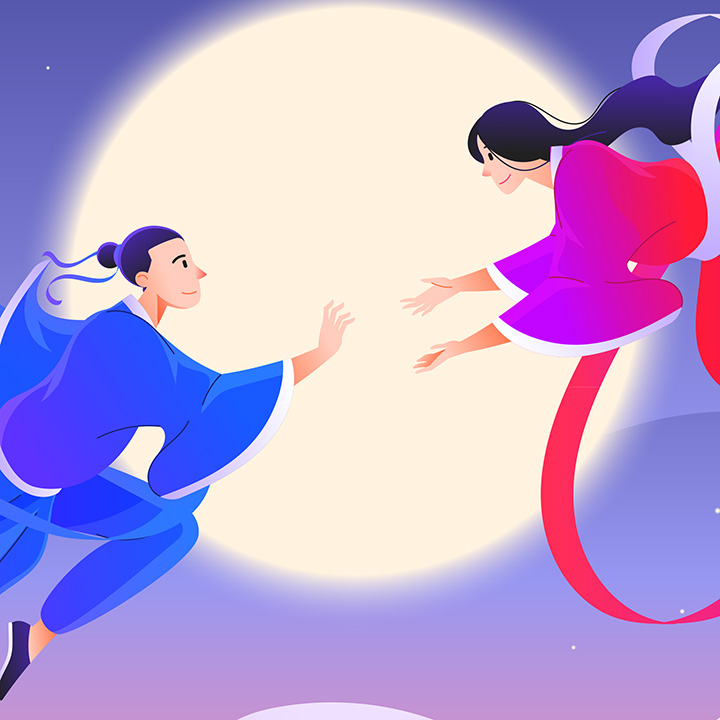
异地恋 yìdìliàn ▸ long-distance romance; long-distance relationship
异国恋 yìguóliàn ▸ international romance; international relationship
Nǐ néng jiēshòu yìdìliàn ma? -
你能接受异地恋吗?
Can you accept long-distance relationship?
Yìguóliàn chénggōng lǜ gāo ma?
异国恋成功率高吗?
(Is the) success rate (of) international relationships high?
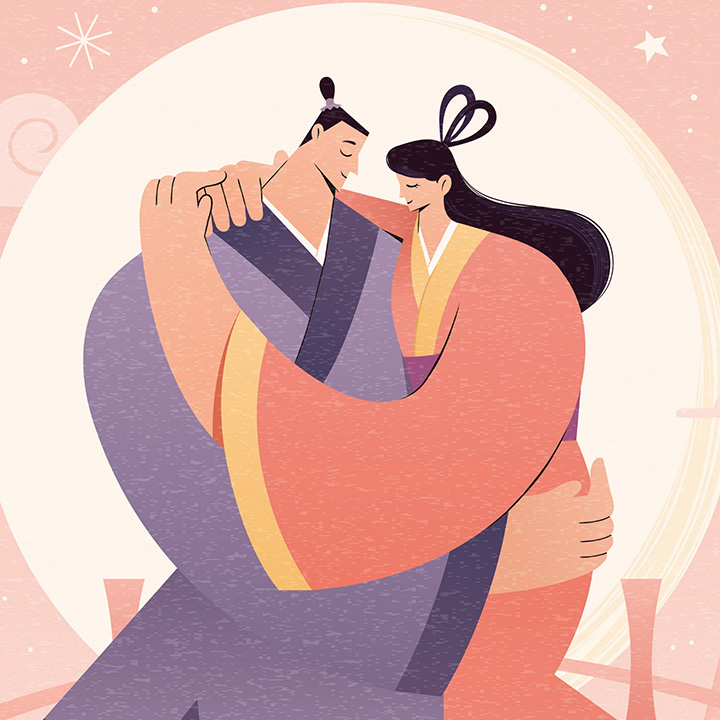
恋爱 liàn’ài ▸ 1) to be in love; 2) romantic love
谈恋爱 tán liàn’ài ▸ to be in a romantic relationship
Liàn’ài shì liàn’ài, jiéhūn shì jiéhūn.
恋爱是恋爱,结婚是结婚。
Love is love, marriage is marriage. [Dating is dating; marriage is another thing.]
-Nǐ tán guo jǐ cì liàn’ài?
-Wǒ hái méi tán guo liàn’ài.
—你谈过几次恋爱?
—我还没谈过恋爱。
-How many times have you been in a romantic relationship?
-I still (have) not been in a romantic relationship.
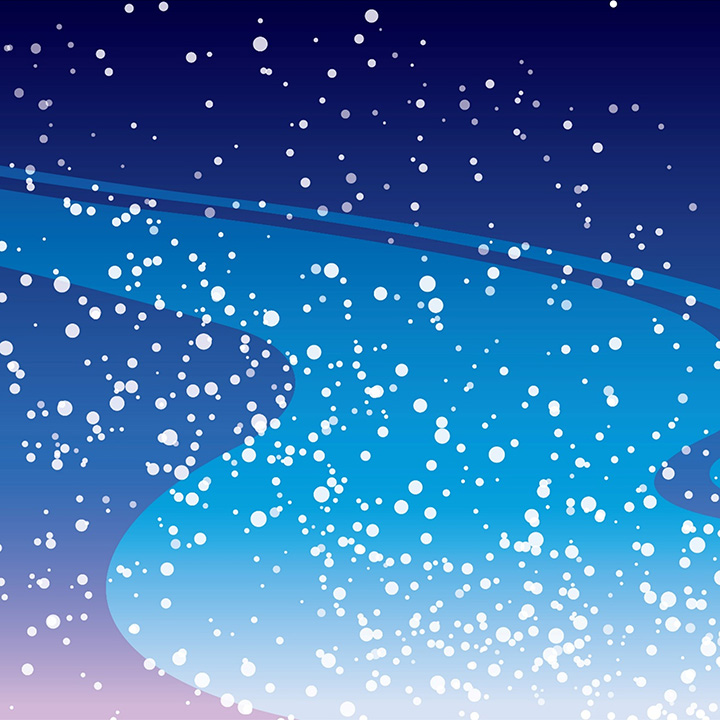
银河 Yínhé ▸ the Milky Way
星星 xīngxing ▸ star
Yínhé li yǒu hěn duō xīngxing.
银河里有很多星星。
(The) Milky Way inside “exists” very many stars. [There are many stars in the Milky Way.]
Wǒ xǐhuan tǎng zài cǎodì shang shǔ xīngxing.
我喜欢躺在草地上数星星。
I like(,) lying on the “grass-floor”(,) counting (the) stars.
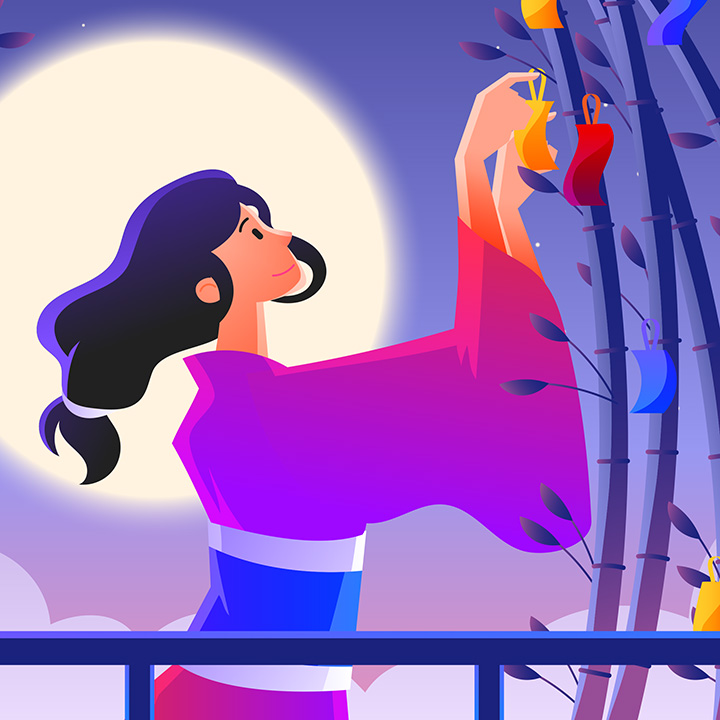
许愿 xǔyuàn ▸ to make (a) wish
Duì zhe Liúxīng xǔyuàn, yuànwàng jiù huì shíxiàn.
对着流星许愿,愿望就会实现。
Make (a) wish “towards” (a) shooting star, (the) wish will come-true.
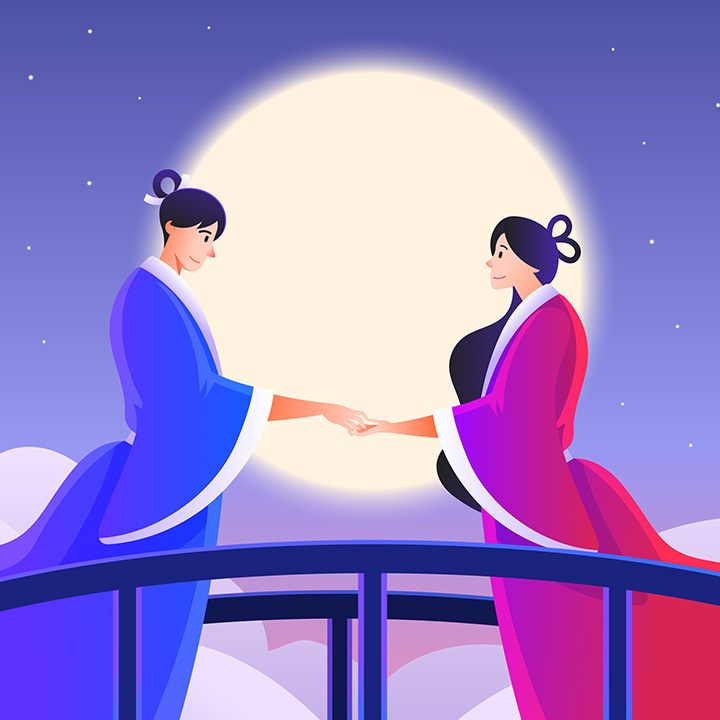
约会 yuēhuì▸ to (go out on a) date
Jīntiān wǎnshang wǒ yào gēn tā yuēhuì.
今天晚上我要跟她约会。
Today evening I will (go out on a) date with her.